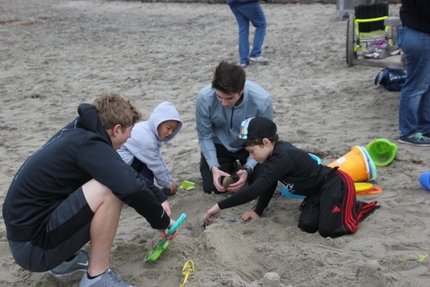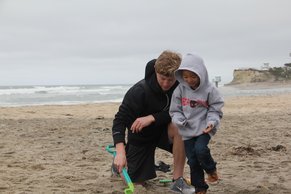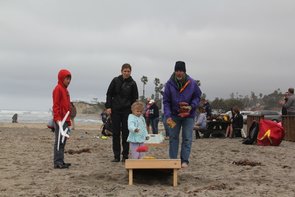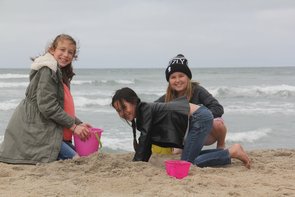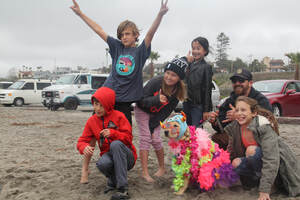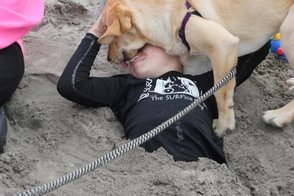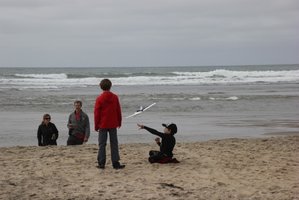CANINE ASSISTED PLAYING
Play therapy
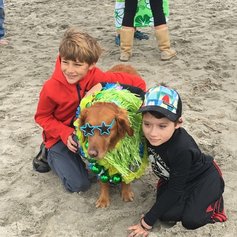
Play therapy is a form of counselling or psychotherapy in which play is used as means of helping children express or communicate their feelings.
Our Canine-assisted playing creates a unique camaraderie between kids with special needs and their families, people with disabilities, combat veterans, wounded warriors, veterans with PTSD, volunteers and our service, emotional support and therapy dogs.
Play is the natural language of kids and dogs! So, it's not surprising that the inspiration for this facet of our Waves of Empowerment program is our new puppy, Cori. She loves to play, and radiates pure, unadulterated joy. She has a way about her that just brings out the happy in people! She also heads up our canine-assisted swimming facet.
We use play as a vehicle to bring diverse populations together in a non-threatening way to achieve the common goal of empowering each individual through accessible play, adaptable equipment and toys. Play is facilitated by our therapy, service and emotional support dogs which deepens the human-animal bond. Kids learn to understand each other’s challenges while accepting them. It’s about letting each child learn from each other. We also use costumes to bring out the creative in participants. Check out our cute dogs, funny pictures page.
We pair the kids with veterans who fought in Iraq and Afghanistan. Veterans and adult volunteers also act as role models and mentors to the kids. And sometimes, kids who have been part of the program for a while act as mentors to adults who are new.
Our Canine-assisted playing creates a unique camaraderie between kids with special needs and their families, people with disabilities, combat veterans, wounded warriors, veterans with PTSD, volunteers and our service, emotional support and therapy dogs.
Play is the natural language of kids and dogs! So, it's not surprising that the inspiration for this facet of our Waves of Empowerment program is our new puppy, Cori. She loves to play, and radiates pure, unadulterated joy. She has a way about her that just brings out the happy in people! She also heads up our canine-assisted swimming facet.
We use play as a vehicle to bring diverse populations together in a non-threatening way to achieve the common goal of empowering each individual through accessible play, adaptable equipment and toys. Play is facilitated by our therapy, service and emotional support dogs which deepens the human-animal bond. Kids learn to understand each other’s challenges while accepting them. It’s about letting each child learn from each other. We also use costumes to bring out the creative in participants. Check out our cute dogs, funny pictures page.
We pair the kids with veterans who fought in Iraq and Afghanistan. Veterans and adult volunteers also act as role models and mentors to the kids. And sometimes, kids who have been part of the program for a while act as mentors to adults who are new.
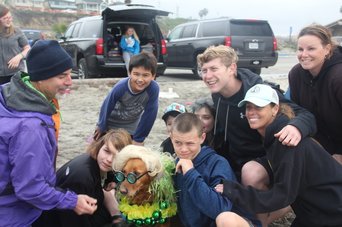
We provide a platform that offers a wide variety of play activities that improves social skills in a fun and interactive way. Research shows that play promotes healthy emotional, social, cognitive, and physical development. One of the most common symptoms of Autism, PTSD and other disabilities is social anxiety. When individuals have anxiety or other significant stress, the hypothalamus part of the brain signals the release of a hormone called cortisol. When too much cortisol is produced, panic attacks and other symptoms can begin. However, when we emotionally connect with others by engaging in play, it can slow the brain waves, reduce stress and slow cortisol release.
Our play sessions are free, interactive, accessible, and open to all ages. Participants are never required to do something they aren’t comfortable with. We’re all warriors fighting some kind of battle that links us together through the challenges we face. We all come together as equals in a safe, caring environment where trusting friendships are built.
Our unique model fosters healing, compassion, growth, empathy, and harnesses the energy of connectedness in all interactions. Please join us by completing this registration form.
Our play sessions are free, interactive, accessible, and open to all ages. Participants are never required to do something they aren’t comfortable with. We’re all warriors fighting some kind of battle that links us together through the challenges we face. We all come together as equals in a safe, caring environment where trusting friendships are built.
Our unique model fosters healing, compassion, growth, empathy, and harnesses the energy of connectedness in all interactions. Please join us by completing this registration form.
From the battleground to the playground
|
Veterans are used to a life of service. When they separate from the military they often feel lost without a sense of purpose. The connectedness they felt with their military brothers and sisters now gives way to feelings of disconnect in their relationships and community.
Many find it difficult to re-integrate back into civilian life. It’s common for returning soldiers with PTSD to have antisocial behaviors and isolate themselves. Many battle with anxiety, depression, hypervigilance and a host of other symptoms. By giving veterans an opportunity to take their skill set and leadership abilities from the battleground and transfer them to the "playground" gives them an outlet to engage in a meaningful mission again. Becoming a mentor through our play activities affords them a renewed sense of purpose. |
Veteran buddy-up mentors
|
In the military, a battle buddy is your battleground partner with whom you accomplish a common mission. Battle buddies are always ready to assist one another. In our “playground”, we match kids one-on-one with veteran mentors. They become buddies of play. Connecting with others who have similar struggles can be very comforting as they offer unconditional acceptance to each other. In addition, being of service to another individual allows them to step outside their own issues to help someone else. Giving back to the community can be very empowering.
|
Players
|
We advocate for inclusion, and everyone, regardless of their abilities or disabilities are welcome to join us. We find that combining all segments of the population fosters relationships built on understanding, acceptance and trust. Many of the players include kids with autism, special needs, physical challenges, those who have parents in the military, kids who feel they don’t have a voice due to emotional challenges that stem from things like being bullied, having a childhood illness, undergoing a custody battle, having a military parent deployed or a myriad of other situations.
|
How does canine-assisted playing work?
|
We provide a safe environment that is supervised, but allows the child the freedom to explore. Kids are allowed to go at their own pace while they get familiar with their surroundings. We begin in their comfort zone and branch out from there. They can choose between various play stations, or create their own game. For kids who tend to get sensory overload, or prefer to be quiet, a craft and game table is provided so every child feels included.
Veteran mentors first follow the child’s lead so the child feels empowered by making the decisions. The child is encouraged to initiate the play activities, explore their creativity and awareness, but if they don’t, the mentor can make suggestions. Socialization, creativity and discovery are encouraged through free play in a sensory-rich environment. We also encourage kids to interact and play with each other which establishes engagement and new friendships. Laughter is always part of our play sessions. This is a great inclusive program for children because they gain independence, confidence and self-worth while being coached by war heroes. |
Benefits of play facilitated by dogs
|
Studies have shown that physiological changes occur when people touch dogs: a drop in heart rate, lower blood pressure, as well as a reduction in stress, depression, anxiety and isolation.
Kids with special needs and military with PTSD who are withdrawn often come out of their shell when in the presence of dogs. Making eye contact with a dog releases a hormone called oxytocin (the hug hormone). It has been shown that eye contact can produce a calming effect and improve relationships. In fact, the mere presence of a dog can improve psychological health and well-being. Dogs also help with grounding, self-esteem, self-worth, emotional reciprocity, sensory overload, random behaviors and more. Because dogs don't judge, kids are able to feel unconditional love and acceptance. |
Types of play
|
Some of the play activities include silly games, outdoor games, relay races, agility, obstacle courses, sand play, team building games, Sensory games, dog training games, story telling, sharing and more.
Kids also work with the dogs, teaching them new behaviors. In addition, we educate both the kids and veterans on canine body language and what the dogs are communicating with no words needed. Some of the kids are non-verbal, but that doesn’t mean they don’t want to play! Play is often a way for them to express themselves. Many connections are made in silence. |
Register for a playing with purpose session
If you'd like to attend a Playing with Purpose session, or are interested in other activities, or you'd like to surf with Ricochet, please complete this registration form.
Volunteer with us
In addition to our veteran and special needs volunteers, we are always looking for water men and women, photographers, videographers, cheerleaders and friends! Just visit our volunteer opportunities page. We have opportunities both locally and globally, so it doesn't matter where you live... you can still get on board!

